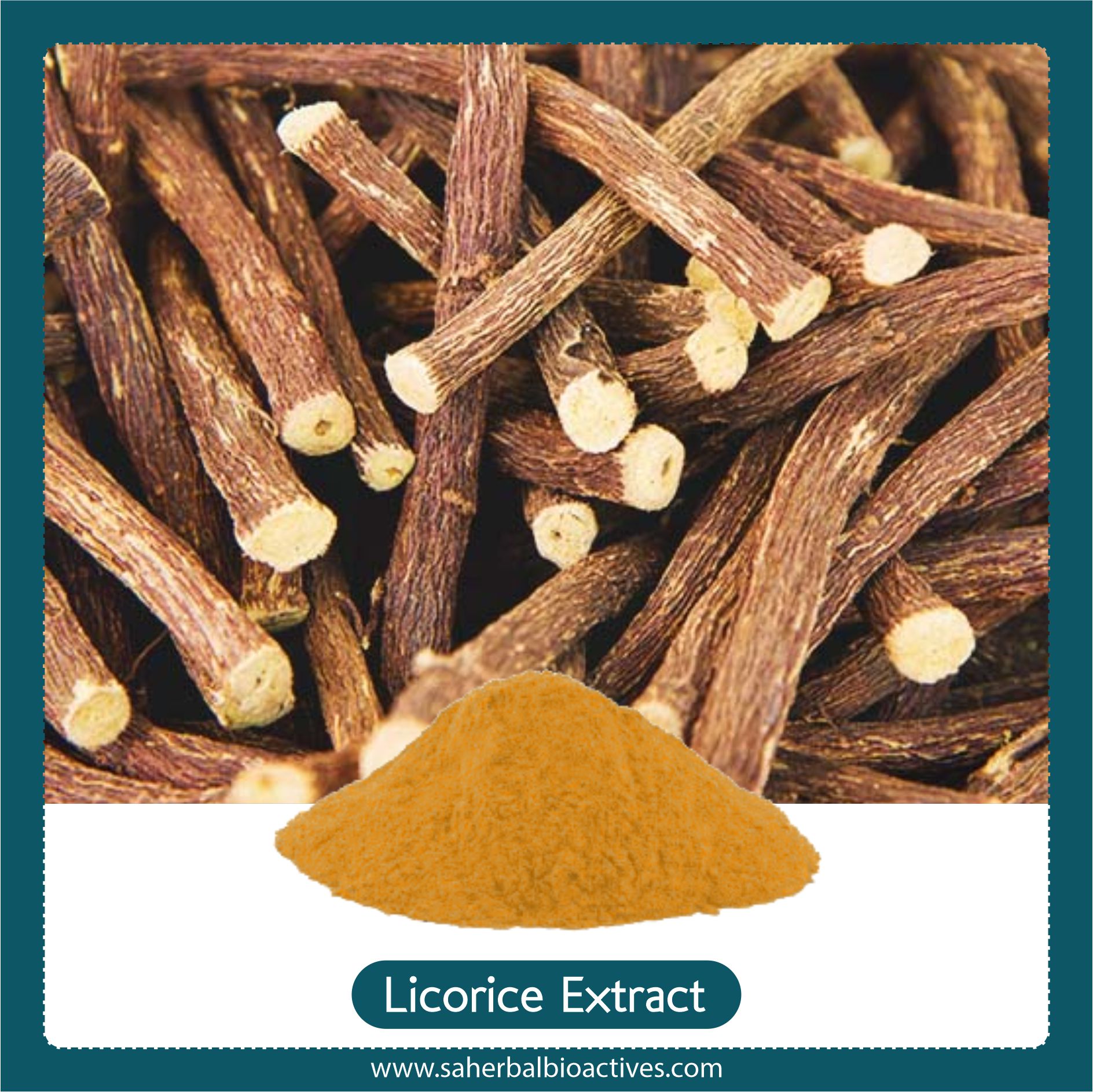Description :
Licorice extract, or licorice, is the root of Glycyrrhiza glabra herb from which a sweet flavor can be extracted (named Glycyrrhizin). The word Licorice is derived (via the Old French licoresse) from the Greek glycyrrhiza, meaning “sweet root”. Licorice flavors are used as candies or sweeteners, particularly in some European and Middle Eastern countries. Licorice extracts have a number of medical uses, and they are also used in herbal and folk medications. Hundreds of potentially healing substances have been identified in licorice as well, including compounds called flavonoids and various plant estrogens (phytoestrogens). The herb’s key therapeutic compound, glycyrrhizin (which is 50 times sweeter than sugar) exerts numerous beneficial effects on the body, making licorice a valuable herb for treating a host of ailments. It seems to prevent the breakdown of adrenal hormones such as cortisol (the body’s primary stress-fighting adrenal hormone), making these hormones more available to the body.
It has a well-documented reputation for healing ulcers. It can lower stomach acid levels, relieve heartburn, hyper-acidity, indigestion and act as a mild laxative.It also has a beneficial action on irritation, inflammation, and spasm in the digestive tract. Through its beneficial action on the liver, it increases bile flow and lowers cholesterol levels.
Licorice also appears to enhance immunity by boosting levels of interferon, a key immune system chemical that fights off attacking viruses. It also contains powerful antioxidants as well as certain phytoestrogens that can perform some of the functions of the body’s natural estrogens; very helpful during the menopause. Study on Glycyrrhizinic acid shows to stop the growth of many bacteria and of viruses such as influenza A.
It has anti-allergic, pain soothing action with fever-reducing properties. It supports anti-tissue action, eases congestion and coughing by helping to loosen & thin mucus in airways, which makes a cough more productive. Licorice supports cortisol enhancing activity, which helps to increase energy, ease stress and reduce symptoms of ailments – like chronic fatigue, muscular pain etc.
Licorice protects the Liver & promotes healing of the damaged cells. It shows anti- inflammatory action with antiviral & anti –oxidants properties that help maintain the overall health of the liver.
The phytoestrogens in Licorice have a mild estrogenic effect, which helps in easing certain symptoms of PMS (premenstrual syndrome) – such as irritability, bloating and breast tenderness. Recent studies have found that by limiting the damage from LDL (bad cholesterol), Licorice may reduce or prevent artery clogging plaque formation & contribute to healthy functioning of the heart.
DGL With excessive use of Licorice extract, some after-effects, such as increased blood pressure, reduced potassium level, whole body edema (swelling) and other minor issues have been noted due to the presence of Glycyrrhizin. Because this would exclude people with blood pressure, liver and kidney issues, as well as pregnant women, licorice extract supplement can be standardized to remove this compound — known as deglycyrrhized licorice (DGL). Having a standardized supplement without this compound also makes the product generally safer for widespread sales.
For otherwise healthy adults without a contraindication, however, glycyrrhizin can absolutely be beneficial, as noted above. In order to minimize the risk of after effects, licorice root extract shouldn’t be overused, and it shouldn’t be taken long term without the consent of Medical practitioner.
Applications of Deglycyrrhizinated Licorice Extract:
- Gastrointestinal Health: DGL is commonly used to treat and manage various gastrointestinal conditions, such as gastritis, acid reflux, and peptic ulcers. Its ability to promote the production of protective mucus in the stomach lining helps soothe irritation, reduce inflammation, and heal ulcers.
- Acid Reflux and Heartburn Relief: DGL is an effective natural remedy for acid reflux and heartburn. By increasing mucus production in the esophagus and stomach, it forms a protective barrier that reduces the discomfort associated with acid reflux.
- Stomach Ulcer Treatment: DGL is often used as a natural treatment for stomach ulcers. It helps heal the ulcerated tissues by enhancing the stomach’s mucosal defenses and reducing the damage caused by stomach acid.
- Irritable Bowel Syndrome (IBS) Support: For individuals with IBS, DGL can help alleviate symptoms such as bloating, cramping, and indigestion. Its anti-inflammatory properties can soothe the gut lining, reducing discomfort and improving overall digestive function.
- Oral Health: DGL is sometimes used in lozenges and mouthwashes for its soothing effects on oral mucosa. It can help relieve symptoms of canker sores, gingivitis, and other oral irritations by promoting healing and reducing inflammation.
- Chronic Cough Relief: DGL is also used as a natural remedy for chronic coughs, especially those associated with throat irritation. Its soothing properties help coat the throat and reduce irritation, providing relief from persistent coughing.
- Chewable Tablets and Lozenges: DGL is commonly available in chewable tablets and lozenges, which are easy to use and particularly effective for quick relief of digestive discomfort. These forms are popular for their convenience and direct action on the mucous membranes of the digestive tract.


